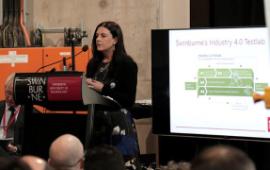Swinburne to host the world’s first graphene certification centre

In Summary
- World first graphene certification centre to be established at Swinburne
- Graphene is the lightest, strongest and most electrically conductive material ever discovered
- Unreliable quality and poor reproducibility has so far prevented an industrial graphene market
I can’t think of any other university in the world that has that entire spectrum of activity supported by industry.”
Swinburne will create the world’s first graphene certification centre as part of its revolutionary research into graphene and digital manufacturing processes.
Under a new research initiative, The Graphene Supply Chain CRC-P, Swinburne researchers will partner with industry to develop graphene to the point where it can meet strict quality assurances and be adopted into large-scale manufacturing.
Graphene is the lightest, strongest, most electrically conductive material discovered and it’s predicted to generate revolutionary new products across all industry sectors.
Graphene’s discoverers were awarded the Nobel Prize in 2010.
But so far, unreliable quality and poor manufacturing reproducibility has prevented an industrial graphene market.
The initiative will take place at Swinburne’s Manufacturing Futures Research Institute and has been made possible by the Collaborative Research Centres Programme of the Australian Federal Government with partners including Imagine Intelligent Materials, Austeng, HRL, Agilent and Duromer.

Director of the Manufacturing Futures Research Institute, Professor Bronwyn Fox, says Swinburne will join with industry to become a “hub” of graphene research in Australia.
“We’re doing everything here at Swinburne from the very fundamental research right through to the translational industrial research in Graphene,” Professor Fox says.
“And I can’t think of any other university in the world that has that entire spectrum of activity supported by industry.”
The initiative was launched as part of an international conference held at Swinburne in August where more than 100 experts gathered to discussed graphene and its use in “smart materials”.
“Smart materials use graphene coated fibres and fabrics that will sense and communicate data.
Professor Fox says these “smart materials’ are a critical component of the next industrial revolution, Industry 4.0, which is the digital transformation of manufacturing processes.
“At Swinburne, we are combining graphene with carbon fibre composites which are an incredibly important engineered material,” says Professor Fox.
“There’s a huge increase in demand for them.
“The vision here is we’ll go from smart materials to smart products using smart processes.”

